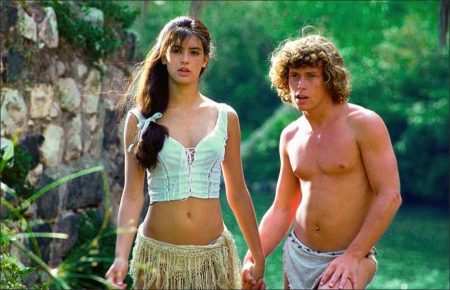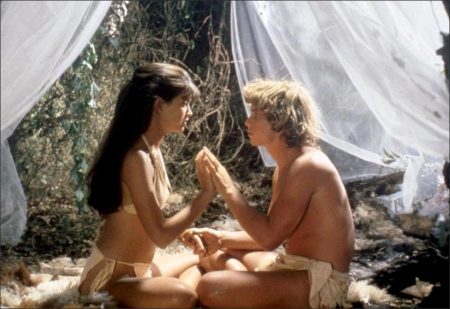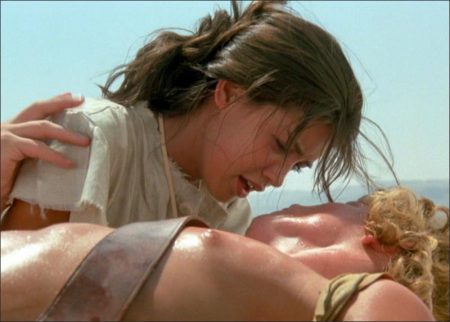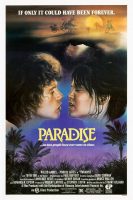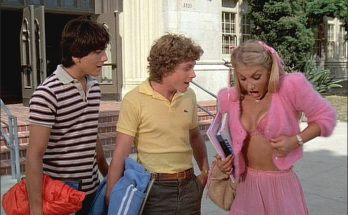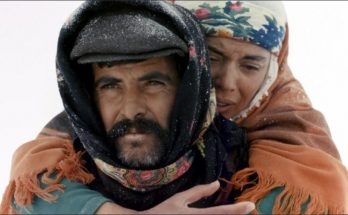Taglines: If only it could have been forever…
Paradise movie storyline. In the Victorian period, two teenagers, David and Sarah, travel with a caravan from Baghdad to Damascus. At an oasis, the white slave agent known as the Jackal raids them, mainly to add the beautiful young Sarah to his harem. Only David and Sarah narrowly escape, and all the others are slayed in the massacre. Their flight leads them to a beautiful oasis – their paradise – where they discover love and sex. However, the Jackal has not given up on Sarah yet, and David must lure him to his death, or be killed by him.
Paradise is a 1982 Canadian romance adventure film starring Phoebe Cates and Willie Aames, written and directed by Stuart Gillard. The original music score was composed by Paul Hoffert with the theme song written and produced by Joel Diamond and L. Russell Brown and sung by Phoebe Cates. It was critiqued at the time as a “knockoff” of the more-famous The Blue Lagoon (1980). The film was marketed with “If Only It Could Have Been Forever… Paradise… No Two People Have Ever Come So Close.”
The films’ themes were similar: Two young people find themselves abandoned in a world with no adult supervision, in fact no other people anywhere. Thus they have total freedom, inevitably learning all about love and sex, as well as basic survival techniques.
Leonard Maltin’s annual Movie Guide book describes it this way: “Rating: star and a half. Silly Blue Lagoon ripoff, with Aames and Cates discovering sex while stranded in the desert. Both, however, do look good sans clothes.” Upon its release, when reviewed on the show Sneak Previews, Roger Ebert selected it as his “Dog of the Week”, the worst film he saw that week and heavily berated it.
The film was rated “R” for nudity and sexuality. The film genre was described as “exotic teen” (a teen film set in exotic locations) which began with The Blue Lagoon in 1980. The song “Paradise” was one of the leaders of the pop music hit parade around the world for a long time, becoming one of the biggest hits of the 1980s and giving resultant fame to the film, more so than the reverse.
Film Review: Paradise
”PARADISE,” at the Cinerama 2 and other theaters, is ”The Blue Lagoon” with camels. It is also, without doubt, the best camel movie of the year to date, though the producers probably mean it to be romantic, and camels are not, by any stretch of the imagination, romantic. They are lumbering, dull-witted, ridiculous-looking creatures who slobber a lot. They are more efficiently functional than esthetically pleasing. To be cruelly blunt, camels are comic.
And so, much of the time, is ”Paradise,” which begins in a Baghdad marketplace in 1823 and is about the sexual awakening of two beautiful, virginal, white, Christian teen-agers. Sarah and David are thrown into their ”Blue Lagoon” situation when the caravan taking them from Baghdad to Damascus is attacked by savage Arabs.
David (Willie Aames) is left an orphan when his American missionary parents are slaughtered in the raid. Sarah (Phoebe Cates), already an orphan, is being escorted back to England by a manservant named Geoffrey (Richard Curnock) who, for plot purposes, doesn’t survive long in the desert.
For most of ”Paradise,” the abandoned David and Sarah ride their camel over sand dunes in a westerly direction toward civilization. ”If we miss Damascus,” the faithful old Geoffrey has said shortly before his demise, ”we’ll certainly hit Alexandria.” They don’t.
However, they do discover a lot of pretty oases where David builds palm-thatched huts with wall hangings from Gimbels, where their clothing becomes scantier and scantier and where there are always deep blue pools in which to bathe and frolic. At one point they are joined by a male chimpanzee they name Doc, who masturbates – this is an R-rated camel movie – to Sarah’s vast amusement and David’s puritanical horror.
Unfortunately, every time David and Sarah get comfy in an oasis, they have to pack up their loincloths and flee – by camel, of course. They are being pursued by an especially lecherous Arab sheik known as the Jackal (Tuvia Tavi), who lusts after Sarah’s downy white English skin. The movie’s big question is who’s going to get Sarah first – David or the Jackal? By this time Doc has become domesticated, a female chimp named Eve having miraculously appeared from behind a dune.
”Paradise,” which was filmed in Israel, was written and directed by Stuart Gillard, a man who appreciates the camel character as a means of moving a story forward. In one of the early, getting-toknow-you scenes, Sarah apologizes to David for having been shorttempered. ”I’m sorry,” she says, ”for having yelled at you when the camel ran away.” In another scene, after David has left Sarah atop the camel to explore the view from an adjacent dune, the beast takes off in the opposite direction. Screams the hysterical Sarah, ”I can’t stop the camel!”
Lines like that don’t grow on date palms. Miss Cates, a New York model, and Mr. Aames, of television’s ”Eight Is Enough,” look good with or without clothes. The chimps, last seen in Bo and John Derek’s ”Tarzan the Ape Man,” are indefatigably anthropomorphic. The camel gets no credit whatever, which has always been the fate of camels everywhere.
Paradise (1982)
Directed by: Stuart Gillard
Starring: Willie Aames, Phoebe Cates, Tuvia Tavi, Richard Curnock, Neil Vipond, Aviva Marks, Joseph Shiloach, Shoshana Duer, Jerry Rosen, Riki Halfon
Screenplay by: Stuart Gillard
Production Design by: Claude Bonnière
Cinematography by: Adam Greenberg
Film Editing by: Howard Terrill
Costume Design by: Mary Jane McCarty, Julie Whitfield
Music by: Paul Hoffert
Distributed by Avco Embassy Pictures
Release Date: May 7, 1982
Views: 3746
